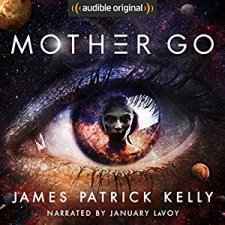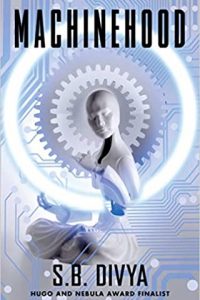Paul Di Filippo reviews James Patrick Kelly
Mother Go, by James Patrick Kelly (Audible Studios B071LJTF1V, $29.95, audiobook) July 11, 2017
 There are two exciting, out-of-the-ordinary aspects to the newest publication from James Patrick Kelly.
There are two exciting, out-of-the-ordinary aspects to the newest publication from James Patrick Kelly.
Of primary interest and importance is this: Mother Go constitutes his first novel since the appearance of Wildlife in 1994. To belabor the obvious math, that’s a gap of twenty-three years. Science fiction and the world at large have undergone about a dozen revolutions since then, so it will be extremely intriguing to see how Kelly’s work reflects a generation of changes. Of course, the man has hardly been silent all that time, producing scores of fine, award-winning stories and editing several anthologies, as well as contributing his regular column to Asimov’s. So we already have a basic idea of his ongoing development and techniques, his interests and his ability to stay cutting-edge. But not at novel lengths.
The second distinctive matter about this publication is that it is an Audible Original: in other words, the Amazon-owned Audible Studios is serving as first-edition publisher. The debut format in which Kelly’s words will be available arrives through their audiobook platform. A print version will not appear until a six-month window of exclusivity is over.
This fresh approach to debuting a book is not unprecedented. I myself participated earlier in such a project: Gardner Dozois’s original anthology titled Rip-Off! in 2012. But it is definitely the road less traveled, and Kelly–who has been a pioneer in this oral/aural mode from way back–deserves credit for his willingness to try something different to reach his audience.
All that said, I should also mention that my review is based on good old silent words-in-a-PDF, not the actual recording, so I cannot comment on the sonic qualities of Mother Go. But I assume they are on a par with Audible’s other high-level deluxe productions.
The first thing to note about this novel is its division into tasty bite-sized segments, each headed with a resonant phrase, that are not structured quite like traditional chapters, but rather almost like compact vignettes linked tail to head. They foster a good linear narrative, a strong plot, but also advance the tale in somewhat staccato fashion, which is consistent with both the jumpy, somewhat skittish and hopscotching mentality of our protagonist, and also with the sharp twists and turns of her space odyssey. It’s a fine union of form and function and theme.
Our tale opens in the year 2159, on the well-settled Moon. We immediately meet our heroine, Mariska Volochkova, a fifteen-year-old immersed in the standard preoccupations of her age and era. Taking her academic lessons; tending hydroponics; learning to adapt to mind feeds (direct person-to-person transmissions into the brain); figuring out what she feels for her tentative boyfriend Jak. But Mariska’s situation is far from normal. She is the clone of Natalya Volochkova, a legendary “spacer” who long-ago embarked on an exploratory mission through an artificial wormhole to a distant galaxy of the hypothesized Builders of the wormhole. This oddball legacy status leaves Mariska deracinated and adrift. And now that her “mother” has returned, with startling news about a habitable planet, and plans to reassert her parenthood, Mari’s destiny feels even more out of control. So she does the only thing she can think of: she activates her genetic legacy that allows her to hibernate, sans exterior aids, rationalizing that if she can stay under for just a year, she will emerge as a legal, sixteen-year-old adult, able to shape her own life.
But instead, three years inadvertently pass and Mari’s recovery is dicey. Awakened, she finally confronts her mother and learns that Natalya wishes to return to the Builders’ Galaxy and start a colony, taking Mariska with her. Mariska rebels, and here follows a series of thrilling and unpredictable adventures that chronicle her maturation and struggles. These exploits notably include being a crew member on a rustbucket transport ship whose safe return to port is not guaranteed.
Eventually, Mariska’s destiny bends towards that of her mother, and she finds herself learning the spacer ropes on Mars. The eventual complicated launch of the colony ship Natividad involves much conspiratorial derring-do, in the face of a faction known as Firsters, who wish to conserve precious resources for the home solar system.
Kelly develops Mari’s character with finesse and grace and depth. And at the same time he gives her resonant foils to play against, the most consequential of whom is of course her mother. The inversion of their relationship is dramatic and striking and touching. But other people in her life, such as her Martian friend and lover Elan, are also vitally depicted and serve as resonant milestones in her life. The reappearance of Jak after many years is particularly shocking.
As for the political and economic and cultural milieu of this future, Kelly has successfully rethought all the old clichés involving a colonized solar system, much in the manner of recent books by Kim Stanley Robinson, Karl Schroeder and others. He shows himself to be part of a wave to take these old concepts and adapt them to 21st-century perspectives and realities.
Kelly has, since the start of his career, bridged the chasm between the cyberpunks and the humanists. His tropes and novums are rigorously hardcore and technologically savvy, yet his treatment of his characters refuses to place them in the usual rigid socioeconomic matrix of outlaws versus corporate types. The Establishment is not the enemy here. He continues this hybrid performance admirably in this book, which has enough technospritz to satisfy fans of Bruce Sterling and enough old-school heart and compassion to match the work of Kelly’s pal John Kessel, whose most recent novel, The Moon and the Other, seems a cousin to this book.
Of course Mother Go slots neatly and proudly into a historic lineage: Heinlein’s Citizen of the Galaxy and Podkayne of Mars. Alexei Panshin’s Rite of Passage. Kelly’s own Wildlife. John Varley’s Thunder and Lightning series. And Joan Slonczewski’s The Highest Frontier, among others.
This tactic of unveiling the realities of the future through the eyes of an adolescent who progresses from immaturity to wisdom is a winner every time, when done deftly. And Kelly shows us that in the gap between novels, he has only gotten more adept, crafty, empathetic and clever at constructing and inhabiting such a cosmic bildungsroman.





